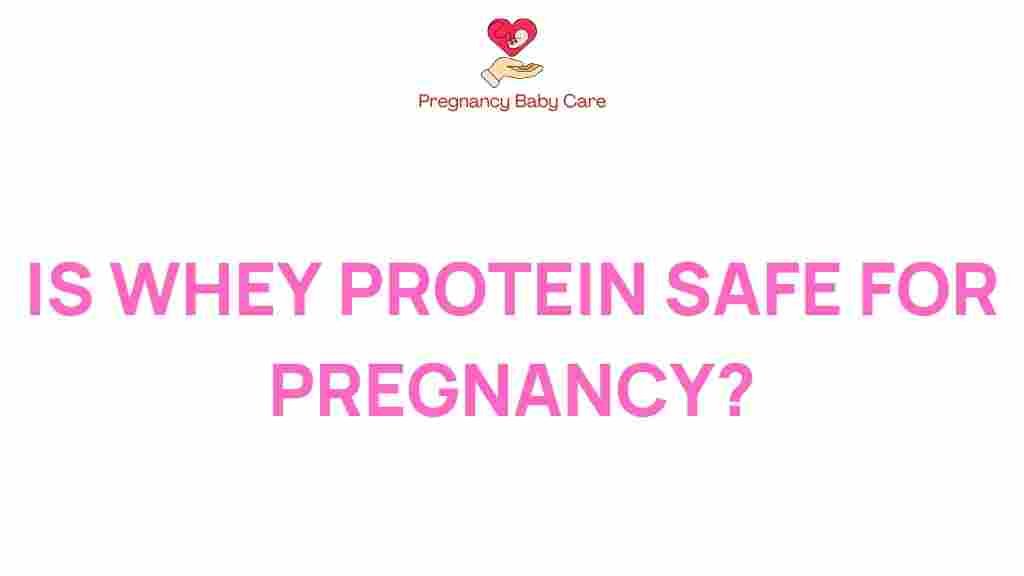The Surprising Truth About Whey Protein Safety During Pregnancy
When it comes to pregnancy, expectant mothers are often overwhelmed with information about what to eat, what to avoid, and how to ensure their unborn child’s health. One topic that frequently arises is the safety of dietary supplements, particularly whey protein. As a popular source of protein for athletes and health enthusiasts alike, many wonder if whey protein is safe for consumption during pregnancy. In this article, we will explore the nuances of whey protein, its implications for pregnancy safety, and how it can fit into an expectant mother’s nutrition plan.
Understanding Whey Protein
Whey protein is a high-quality protein derived from milk during the cheese-making process. It contains all nine essential amino acids and is known for its rapid digestion and absorption. This makes it a popular choice among athletes and those looking to increase their protein intake. However, as with any dietary supplement, it is important to consider its safety, especially during pregnancy.
The Importance of Nutrition During Pregnancy
Nutrition plays a critical role in prenatal care and maternal health. Expectant mothers need to ensure they consume adequate amounts of various nutrients to support both their health and the development of their baby. Key nutrients include:
- Protein: Vital for the growth and repair of tissues.
- Folic Acid: Essential for the proper development of the baby’s neural tube.
- Iron: Important for preventing anemia and supporting increased blood volume.
- Calcium: Needed for the development of the baby’s bones and teeth.
Incorporating sufficient protein into the diet is essential, and whey protein can be a convenient option for many women.
Whey Protein and Pregnancy Safety
When considering whey protein for pregnancy, several factors must be taken into account:
- Quality of the Product: Not all whey protein supplements are created equal. It is crucial to choose high-quality products that are free from harmful additives, artificial sweeteners, and contaminants.
- Individual Health Conditions: Some women may have lactose intolerance or allergies to dairy products. In such cases, whey protein may not be suitable.
- Consulting Healthcare Providers: Before incorporating any dietary supplements, including whey protein, expectant mothers should consult their healthcare providers to ensure it fits their specific health needs.
Benefits of Whey Protein for Expectant Mothers
Despite concerns regarding safety, whey protein can offer several benefits for pregnant women:
- Supports Increased Protein Needs: During pregnancy, protein requirements increase. Whey protein can help meet these needs without excessive calorie intake.
- Promotes Muscle Health: Maintaining muscle mass is important for overall health during pregnancy, and whey protein can assist in this regard.
- Convenient Source of Nutrition: For mothers with busy schedules or those experiencing nausea, whey protein shakes can serve as a quick, nutritious option.
How to Safely Incorporate Whey Protein into Your Diet
Here’s a step-by-step process to incorporate whey protein safely into your pregnancy nutrition plan:
- Consult Your Doctor: Discuss with your healthcare provider whether whey protein is appropriate for you.
- Select a Quality Product: Choose a reputable brand that offers whey protein isolate or concentrate, ideally free from additives.
- Start with a Small Amount: Begin with a small serving to assess your body’s response, especially if you have never used protein supplements before.
- Incorporate into Meals: Add whey protein to smoothies, oatmeal, or yogurt to enhance the nutritional value of your meals.
- Monitor Your Body’s Response: Pay attention to any adverse reactions, and consult your doctor if you experience discomfort.
Potential Risks of Whey Protein During Pregnancy
While whey protein can be beneficial, there are some risks to consider:
- Lactose Intolerance: Women who are lactose intolerant may experience gastrointestinal discomfort from whey protein.
- Kidney Health: Excessive protein intake can strain the kidneys, especially if there are pre-existing kidney conditions.
- Contaminants: Some protein powders may contain harmful substances or heavy metals. Always choose certified products.
Frequently Asked Questions
Is whey protein safe during breastfeeding?
Whey protein is generally considered safe during breastfeeding, but it’s important to consult with a healthcare provider for personalized advice.
Can I use whey protein to gain weight during pregnancy?
If you need to gain weight, whey protein can be a helpful addition to your diet, but it should be part of a balanced nutritional plan.
What are the alternatives to whey protein?
If whey protein is not suitable, consider plant-based protein powders like pea, hemp, or brown rice protein.
Troubleshooting Tips
If you encounter challenges when incorporating whey protein into your pregnancy diet, consider the following:
- Digestive Issues: If you experience bloating or discomfort, try reducing the serving size or switching to a whey protein isolate, which is lower in lactose.
- Flavor Preferences: If you don’t enjoy the taste, try mixing it with fruits, nut butter, or in baking recipes.
- Cost Concerns: Look for sales or bulk purchase options to make high-quality whey protein more affordable.
Conclusion
Whey protein can be a safe and beneficial dietary supplement for expectant mothers when used properly. It offers essential nutrients that support maternal health and fetal development, making it a valuable addition to a well-balanced diet. However, it is crucial to prioritize pregnancy safety by selecting quality products, consulting healthcare providers, and monitoring individual responses.
As with any dietary choices during pregnancy, informed decisions are key. By focusing on overall nutrition and maintaining open communication with healthcare professionals, expectant mothers can ensure they are supporting their health and the health of their baby effectively. For more information on pregnancy nutrition, you can visit this resource.
In conclusion, while incorporating dietary supplements like whey protein into your diet during pregnancy can be advantageous, it should always be done with caution and care for the well-being of both mother and child.
This article is in the category Pregnancy and created by PregnancyBabyCare Team
